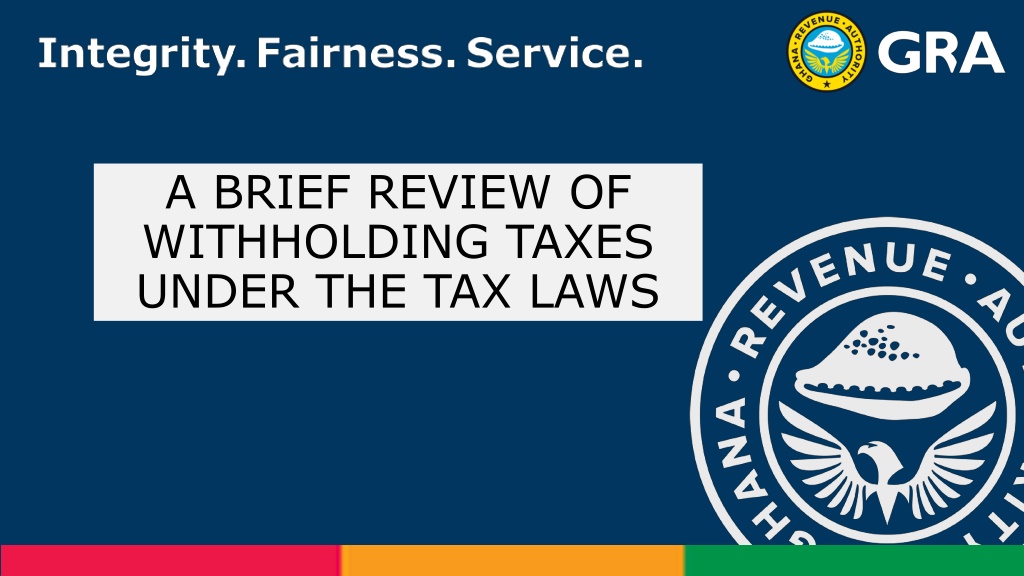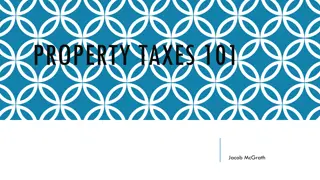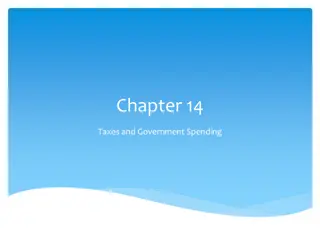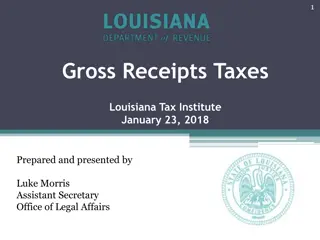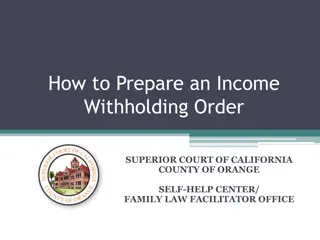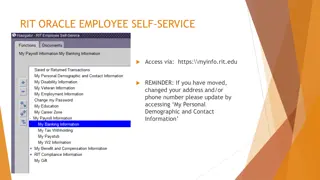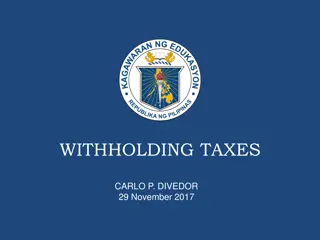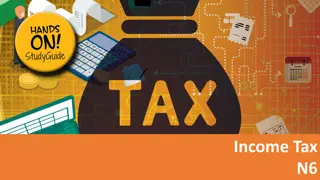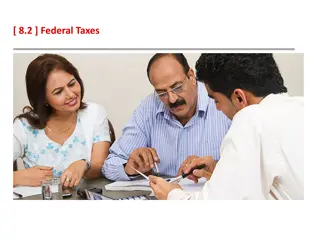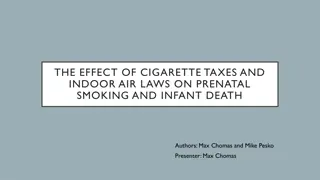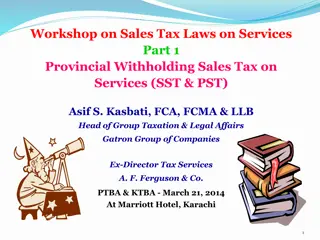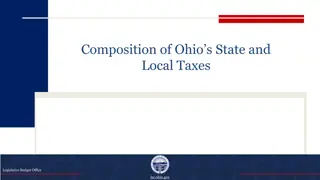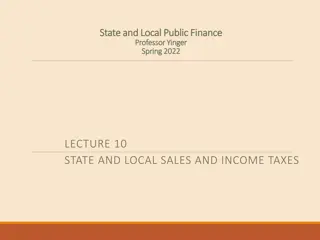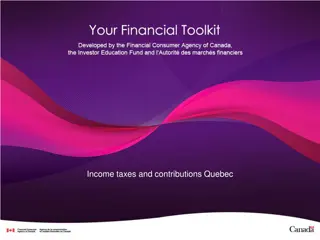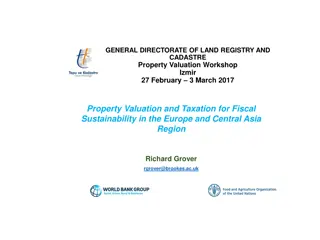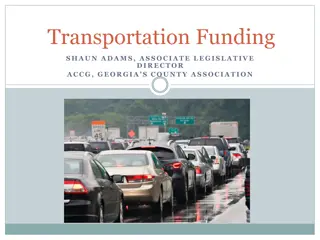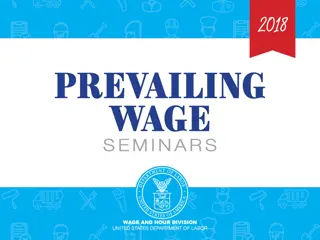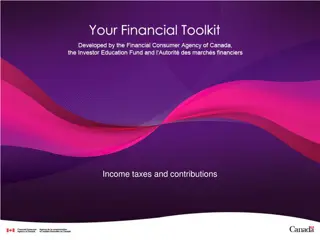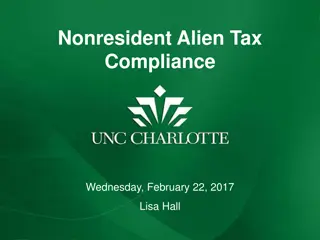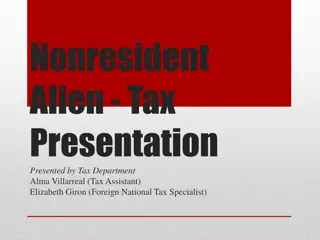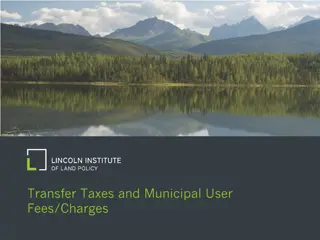Understanding Withholding Taxes: A Comprehensive Overview
Explore the intricacies of withholding taxes under tax laws, including definitions, categories, exemptions, and double taxation considerations. Learn about the role of withholding agents, withholdees, and the Ghana Revenue Authority. Delve into specific sections of the Income Tax Act, 2015 and discover the various withholding rates for different income brackets. Gain insights into withholding from employment income, investment returns, supply of goods and services, and more.
Download Presentation

Please find below an Image/Link to download the presentation.
The content on the website is provided AS IS for your information and personal use only. It may not be sold, licensed, or shared on other websites without obtaining consent from the author. Download presentation by click this link. If you encounter any issues during the download, it is possible that the publisher has removed the file from their server.
E N D
Presentation Transcript
A BRIEF REVIEW OF WITHHOLDING TAXES UNDER THE TAX LAWS
OUTLINE OF THE PRESENTATION Definition of withholding taxes Categories/types of withholdings Withholding exemptions Withholding, double taxation?
OBJECTIVE OF THE INTERACTION Everybody should take something home on our withholdings under the tax laws!
WITHHOLDING TAX (WHT) It is a tax which is deducted at source by a withholding agent (a person required to deduct tax) when making payment to a withholdee (a person receiving or entitled to receive payment from which tax is required to be withheld) and accounted for, later to the GRA. The Income Tax Act, 2015 (Act 896) as amended identified four categories of withholding; i. Withholding by employer (Section 114 of Act 896) ii. Withholding from investment returns (Section 115 of Act 896) iii. Withholding from supply of goods, service fees and contract payments (Section 116 of Act 896) iv. Withholding from consideration on realisation of assets and liabilities (Section 16A, Income Tax (Amendment) Act, 2023 (Act1094) v. NB: Value Added Tax (Amendment) (No. 2) Act, 2017 (Act 954), amended section (47) of the principal enactment by introducing Value Added Tax (VAT) withholding.
i. Section (114) of the Income Tax Act, 2015 (Act 896) as amended is to the effect that an employer shall withhold tax from the payment of an amount to be included in ascertaining the income of an employee from the employment. NB: for resident individuals the withholding is by the graduated rate, while non-resident individuals suffer withholding at a flat rate of 25%. WITHHOLDING BY EMPLOYER 2023 MONTHLY TAX RATE FOR RESIDENT INDIVIDUALS S/N CHARGEABLE INCOME (GH ) 1 FIRST 402.00 2 NEXT 110.00 3 NEXT 130.00 4 NEXT 3,000.00 5 NEXT 16,395.00 6 NEXT 7 EXCEEDING 50,000.00 RATE (%) FREE NIL 5 10 17.5 25 30 35 TAX (GH ) CUMMULATIVE INCOME (GH ) 402 512.00 642.00 3,642.25 20,037.00 50,000.00 CUMMULATIVE TAX (GH ) NIL 5.50 18.50 543.50 4,642.25 13,631.15 5.50 13.00 525.00 4,098.75 8,988.90 29,963.00
SECTION 114 WITHHOLDINGS CONT. Regulation 5 of the Income Tax Regulations, 2016 (LI 2244) is on amount to be withheld by employers from overtime and bonus payments. i. Over time payment to a qualifying junior employee-withhold at the rate of 5% if the amount does not exceed 50% of the basic salary for the month. Withhold from the excess at 10%. The tax withheld is a final tax. ii. In making bonus payment to an employee during a year of assessment, the employer shall, a. if the total of the bonus payments made by that employer to the employee does not exceed 15% of the annual basic salary of that employee withhold tax from the gross amount of the payment at the rate of 5%. The tax withheld is a final tax. b. add the excess payment to the employment income of the employee for the year and withhold tax in accordance with the First Schedule of the Act.
SECTION 114 WITHHOLDINGS CONT. Regulations 6 and 7 of LI 2244 are on withholding from casual and temporary workers respectively. Section 78 of the Labour Act, 2003 (Act 651) defined a temporary worker to means a worker who is employed for a continuous period of not less than one month and is not a permanent worker. For temporal employees, the withholding is in accordance with section 114 of the First Schedule to Act 896. A casual worker is engaged on a work which is seasonal or intermittent and is not for a continuous period of more than six months and whose remuneration is calculated on daily basis. A person shall withhold tax from the gross income paid to a casual worker at the rate of 5%. This withholding is treated as final withholding.
ii. WITHHOLDING FROM INVESTMENT RETURNS Section 115 of the Income Tax Act, 2015 (Act 896) as amended is to the effect that a resident person shall withhold tax at the rate specified in paragraph 8 of the first schedule where that person pays any dividend (8%0, interest (1%/8%,) natural resource payment (15%), rent (8%/15%) or royalty (15) to another person and the payment has a source in the country. NB: this section does not apply to payments subject to withholding under section 114, payments made by an individual unless in conducting business, interest paid to a resident financial institution or a payment that is an exempt amount.
iii. WITHHOLDING FROM SUPPLY OF GOODS, SERVICE FEES AND CONTRACT PAYMENTS Section 116 (1) of the Income Tax Act, 2015 (Act 896) as amended is to the effect that, a resident person shall withhold tax at the rate provided for in paragraph 8 of the First Schedule where that person a. Pays a service fee with a source in the country to a resident individual i. as fees or allowances to a resident director, manager, trustee or board member of a company or trust (20%) ii. For examining, invigilating, supervising an examination or part time teaching or lecturing, as an endorsement fee, as commission to a sales agent, as a commission to a resident insurance sales or canvassing agent (10%) b. Pays a service fee or an insurance premium with a source in the country to a non-resident person (20%)
SECTION 116 WITHHOLDINGS CONT. Section 116 (2) of Act 896 is to the effect that, a resident person, other than an individual, shall withhold tax on the gross amount of the payment at the rate specified in the First Schedule when the person makes a payment to another resident person who does not fall within subsection (1) or section 114 for a. the supply or use of goods b. Supply of any works or c. Supply of services In respect of a contract between the payee and the resident person. NB: subsection (2) applies to a contract between the payee and a resident person where the amount of the contract exceeds two thousand currency points. For the purpose of determining whether a contract meets the two thousand threshold, two or more contracts in respect of the same goods, works or service shall be treated as a single contract.
Section 116A inserted 9.The principal enactment is amended by the insertion after section 116, of Withholding from consideration on realization of assets and liabilities 116A. Where a resident person other than an individual pays consideration to another person with respect to the realization of an asset or a liability which does not fall under section 115, the resident person shall withhold tax on the gross amount at the rate of 3% for a resident person and 10% for a non-resident person
iv. WITHHOLDING VAT The Value Added Tax (Amendment)(No. 2) Act, 2017 (Act 954) amended section 47 of the principal enactment by the insertion of 47A, 47B and 47C 47A. Appointment of Value Added Tax Withholding Agent The Commissioner-General may in writing appoint a Value Added Tax Withholding Agent for the Authority. 47B. Duties of a Value Added tax Withholding Agent The appointed agent shall perform the following duties: Withhold from the payment to a registered VAT trader, 7% of the taxable output value of standard rated supplies; and At the time of making payment for the standard rated supplies, issue a withholding VAT Credit Certificate in the form prescribed by the C-G to the supplier.
47C. Scope of VAT Withholding Agent VAT registered entities whose supplies are zero rated; and Selected Government and other VAT registered entities The Act also amended section 52 of the Principal enactment by the addition of subsection (9) Despite subsections (4) and (5), a VAT Withholding Agent shall, not later than the 15thday of the month immediately following the month to which the returns relates, Submit to the C-G returns relating to the VAT withheld under 47B for each period in accordance with the prescribed form; and Pay the amount withheld for each period to the Commissioner-General
STATEMENT AND PAYMENT OF TAX WITHELD OR TREATED AS WITHHELD Section 117 (1) of Act 896 as amended is to the effect that a withholding agent shall pay to the Commissioner-General within fifteen days after the end of each calendar month, a tax that has been withheld during the month. Subsection (2) of Section 117 of Act 896 stipulates that a withholding agent shall file with the Commissioner-General within fifteen days after the end of each calendar month, a return prescribed by the Commissioner-General.
WITHHOLDING CERTIFICATE Section 118 (1) of Act 896 stipulates that a withholding agent shall prepare and serve on a withholdee a withholding certificate in the prescribed form. The withholding certificate shall cover a calendar month and shall be served on the withholdee within thirty days after the end of the month. NB: In filing the withholding return, if the withhodee s TIN/GUIN is provided, the withholdee s ledger will be credited directly, and there will be no need for the withholding certificate.
FINAL WITHHOLDING PAYMENT Section 119 of the Income Tax Act, 2015 (Act,896) as amended, specifies payments which constitute final withholding payments. Some of these payments are; i. Dividends paid by a resident company ii. Rent paid to a resident individual under a lease of land or a building, with or without associated fittings, situated in the country, other than rent received by an individual in conducting business, sale or letting iii. Rent other than rent received in conducting a business of sale or letting, paid to a person other than an individual under a lease of land or a building situate in Ghana, with or without associated fittings and fixtures. iv. Winnings from lottery
FINAL WITHHOLDING PAYMENT CONT. iii. Payments made to a non-resident person that are subject to withholding other than payments derived through a Ghanaian permanent establishment.
EXEMPTION PROCEDURES 1. Charitable Organisations (Section 97 of Act 896) Section 97(1) of the Income Tax Act, 2015 (Act 896) is to the effect that, the Commissioner-General may approve an entity as a charitable organization for the purposes of the Income Tax Act. Section 97(2) of 896 stipulates that the C-G shall, before approving an entity under subsection (1), ensure that a) The entity is establish to operate as i. charitable institution which is of public nature ii. A religious institution which is of a public nature iii. A body of persons formed for the purpose of promoting social activities or sporting activities
APPROVAL OF CHARITABLE ORGANISATIONS CONT. (b) The entity has a written constitution that prohibits it entity from i. Engaging in a party political activity, supporting a political party or using its platform to engage in party politics ii. Any function other than those specified in paragraph (a) iii. Conferring a private benefit, other than in pursuit of a function of the entity Section 97(4) of Act 896 states that, the income accruing to or derived by a charitable organization is exempt from tax. NB: the exemption does not apply to the business income of the charitable organization.
2. Young Entrepreneurs exemption (Section 4 of the Income Tax (Amendment)(No. 2) Act, 2017 (Act 956); The principal enactment is amended in the sixth schedule by the substitution for paragraph 6 of Young entrepreneurs The income of a young entrepreneur from the business of manufacturing, information and communication technology, agro processing, energy production, waste processing, tourism and creative arts, horticulture and medicinal plants shall be exempt from tax for a period of five years. A young entrepreneur is defined by the Act to mean an entrepreneur who is not more than thirty-five years old
3. Withholding tax exemptions (Section 116(5)(c) of the Income Tax Act, 2015 (Act 896) as amended It is a special dispensation granted on exceptional grounds. The withholding taxes for which exemption is considered are the 7.5% withholding tax on supply of services (Section 116 (2)c of the Income Tax Act, 2015 (Act 896) as amended 3% withholding tax on supply or use of goods (Section 116 (2)a of the Income Tax Act, 2015 (Act 896) as amended and 5% withholding tax on the supply of any woks (Section 116 (2)b of Act 896.
WITHHOLDING, DOUBLE TAXATION? Economic double taxation Juridical double taxation
